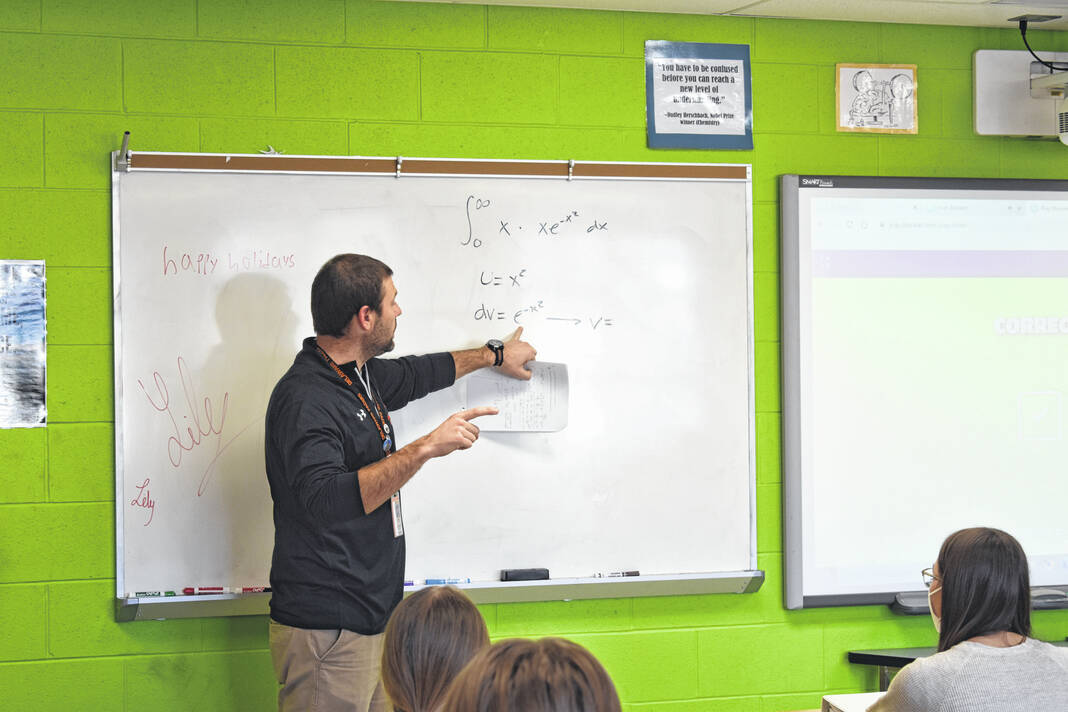
At the conclusion of fall semester at Hayes High School, the architects of the school’s new mastery-based grading system said they saw positive results in the classes that used it and plan to continue to roll the system out to more grades and classes next year.
Assistant Principal Rex Reeder said the new assessment and grading system is focused on building a skill set for students using a more objective set of requirements. Reeder said the classes are using a scale that has a list of skills and how students are progressing in those areas, grading them from 0 to 4. Reeder said the new scale provides more feedback and clarity, and it gives students more chances to improve before their grades are calculated at the end of the year.
“There are number of skills being broken down, and you can see what a child is scoring on each of these on a proficiency scale,” Reeder said. “They are getting a score. I’m giving you feedback in each area for each skill. The idea is, any of these would give you information on how to improve. Grades are all year, so they have a chance to show growth.”
Reeder added the new scale adds continuity and objectivity to the grading process, which can vary wildly teacher to teacher.
“Every teacher’s ‘C’ is different,” he said. “Now they are all lined up to the scale. … Every single scale will go to the next teacher in line, so they’ll have data on every kid and what skills they can do.”
Reeder said the skills on the scale are chunked, meaning that developing a group of skills will account for large portions of the final grade instead of traditional exams. Reeder said the new scale eliminates the problem of students doing poorly on their first exam, which makes up a quarter of their final score, and sinking their grade for the rest of the semester because on the new scale they can improve the skills they were lacking before and increase their grade.
“If a kid fails (a traditional) course, you have to take the whole course over again online,” Reeder said. “In this model, what I would do is I have a score. I’d look at where they are failing and do summer learning on those four zeros, get them to a 1, and then pass the student.”
Reeder said in lieu of final exams, students are assessed on their skills and are graded accordingly.
“Students are not so stressed out,” he said. “We’re not doing exams where one test is 10% of your grade. Failures are within reason and have dropped, and by the end of the year, we’ll have less failures, no doubt about it. Kids are not as panicked. The assessments are your chance to show what you can do without punishment.”
Reeder said the scale also pushes the current top academic students to apply themselves more, which will help them score better on tests like the SAT or ACT and develop a skill set they will use in college and in the workforce.
“(Our top) students are having to work more, which we want, because those students are scoring higher,” Reeder said. “Some kids like it, some don’t. There’s been some transition on that.”
Reeder said the scale is being used in all freshman core classes this year and is being piloted in a small group of sophomore classes. The scale will roll out to sophomore core classes next year with pilot classes at the junior level.
“Education has to change,” Reeder said. “This is going to allow students to move through the curriculum at their own pace. Take as long as you want, we’ll keep assessing you. Most schools are struggling to keep their kids engaged. We’re trying to personalize (education) and get to them on all fronts. We’re seeing a beginning. Once parents understand what we’re doing, they’re happy.”
“Education has to change, and we are the leaders in that change,” said Principal Dr. Ric Stranges, who presented the scale with Reeder at an education conference in Florida last month. “We’ve had a lot of support in the district to make this happen.”
Reeder said he’s thankful for the support of the administration and the Delaware City Schools Board of Education, and he’s proud of the work of the teachers who adopted the scale.
“This is built from scratch. I can’t say enough that they’ve done an outstanding job,” Reeder said. “We have a lot of people working hard to make it happen. Everybody would like to do something like this, but it takes a lot of effort and details.”
More information about the scale can be found at https://www.dcs.k12.oh.us/hayeshs in the form of video presentations.


